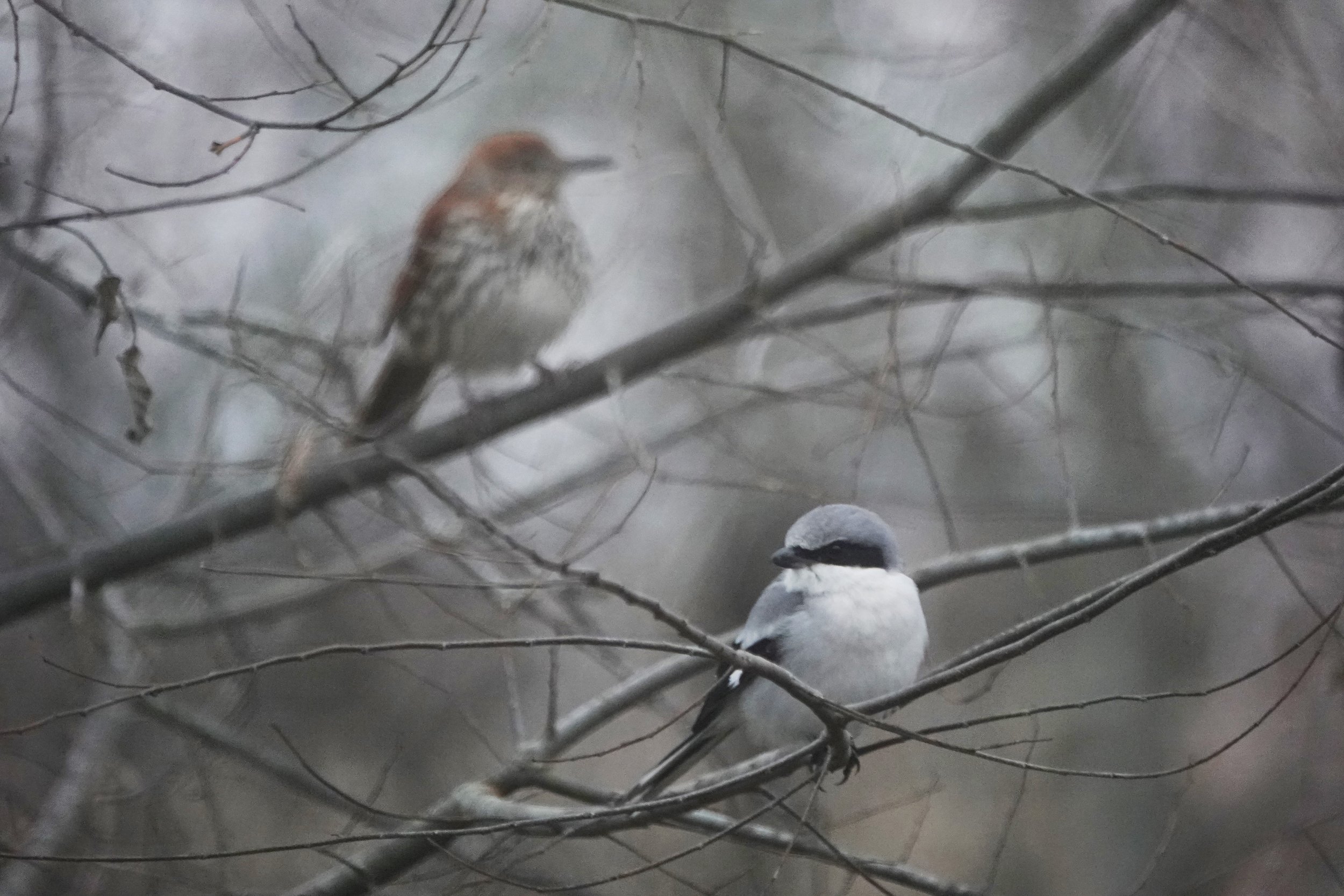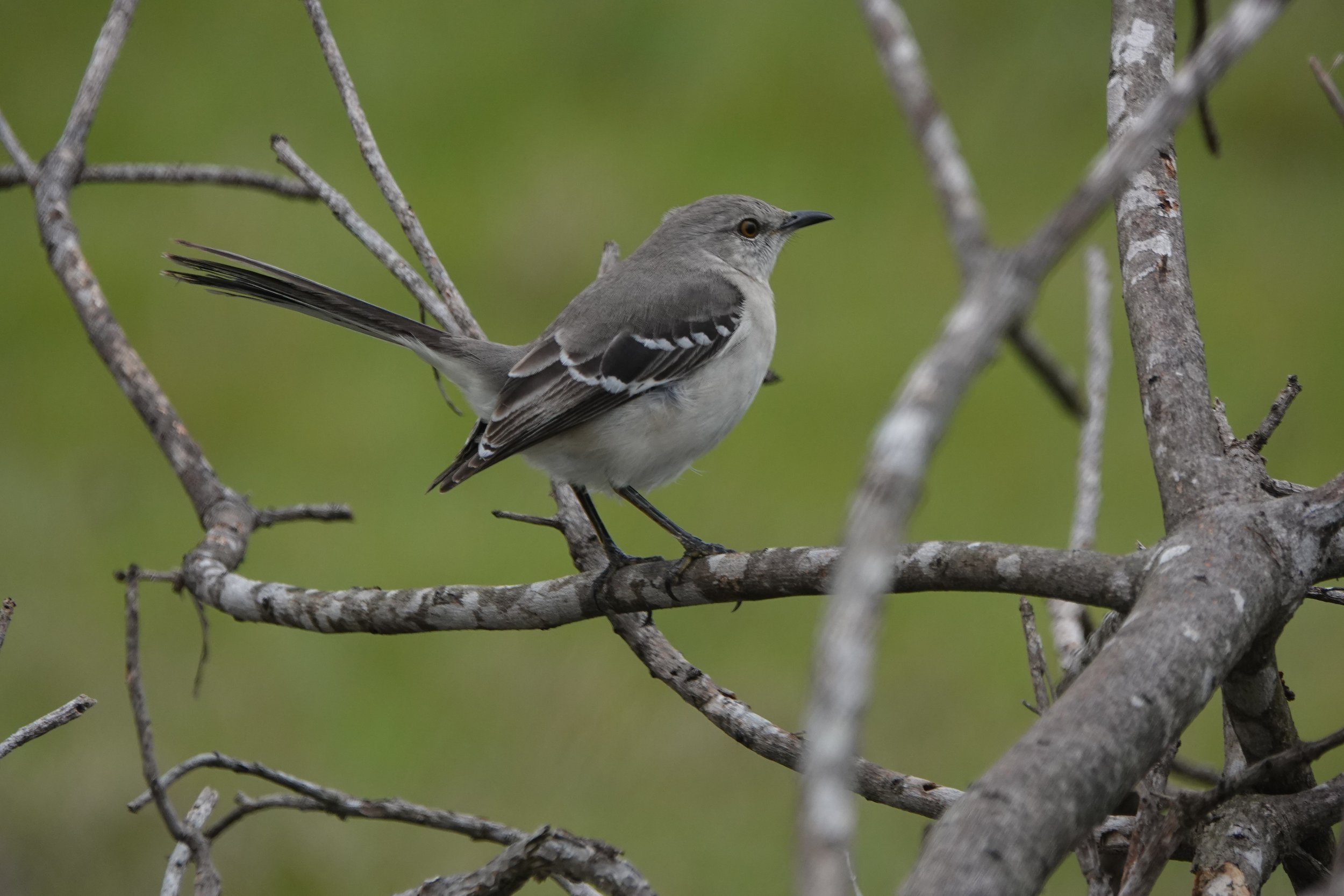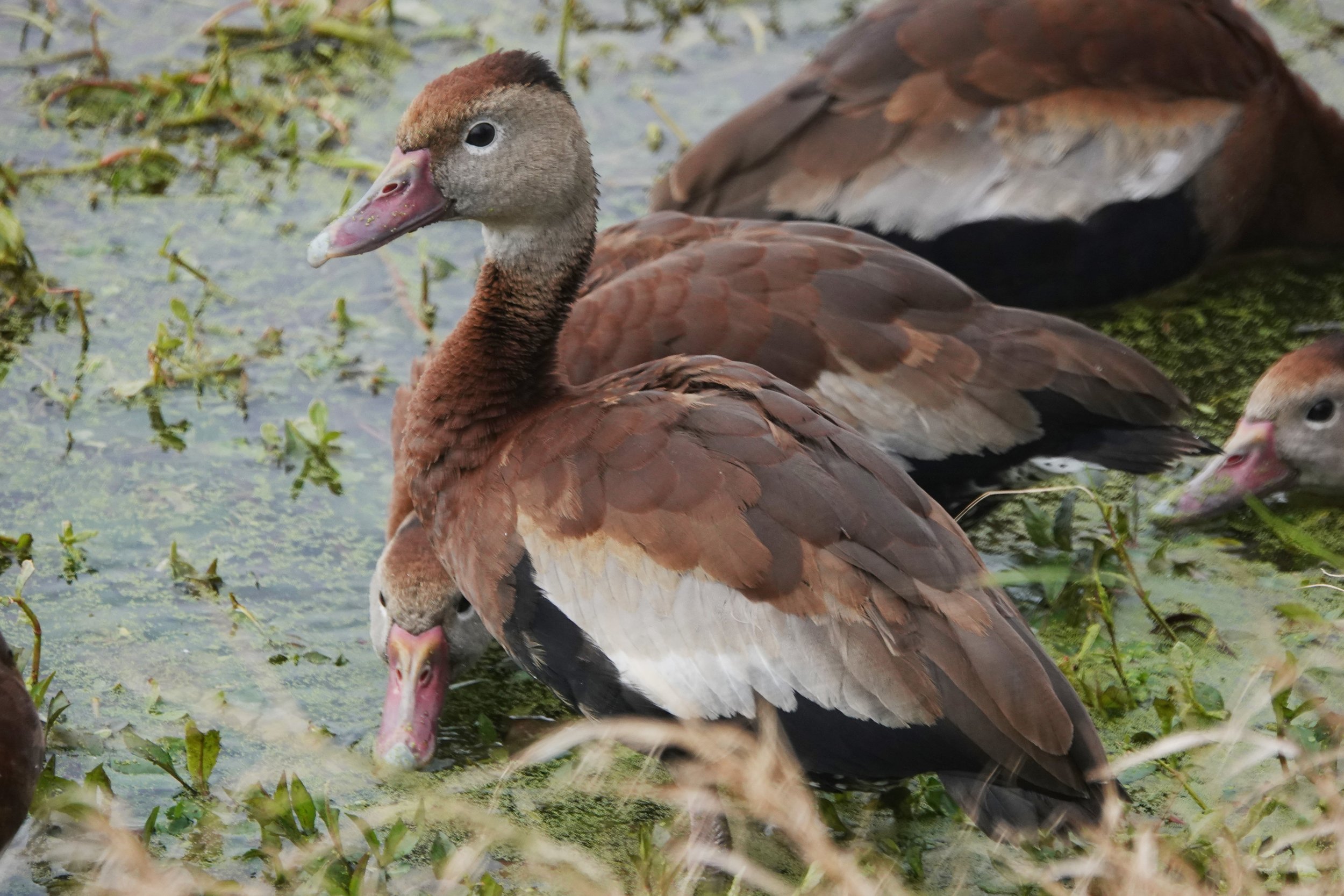Christmas Bird Count (CBC) morning dawned at 6°F; the afternoon high was 30°F. While that sounds like a typical morning of a Wisconsin CBC, it was actually the morning of the Buffalo Bayou, Texas CBC in west Houston on December 23, 1989. On that same CBC in December 1990: low 22°F, high 33°F, ice storms playing havoc with travel (one CBC vehicle broke an axle in a skid). Those temperatures were maybe more typical of the Madison area, but they can happen in southeast Texas.
Loggerhead Shrike scans the surroundings as a Brown Thrasher keeps an eye on things. Photo by Bob Honig
At the other extreme, this year’s Cypress Creek CBC—just west of Houston on the Katy Prairie where my wife Maggie and I lived for the past 15 years—reported a stunningly high temperature of 86°F on January 1! A temperature warmer than usual can bring out swarms of mosquitoes. No such issues on Wisconsin CBCs!
Typically, Houston area CBC weather is fairly moderate, just chilly and usually damp with high humidity from the Gulf of Mexico. For example, temperatures for the Buffalo Bayou CBC in December 1991, were more typical—low 61°F, high 68°. Torrential rains can and have been a problem during CBCs, rarely an issue for Wisconsin’s Decembers.
Bob and Maggie Honig at Moquah Barrens SNA (Wisconsin) in Fall 2021. Photo by Maggie Honig
After roughly 30 and 40 years, respectively, in the Houston area, Maggie and I moved to Wisconsin in mid-2021. We were very active Christmas Bird Count participants in Texas, as observers, Area Leaders, Compilers, and CBC founder. So we dove right into two Wisconsin CBCs. There was no snow on the ground on the December 18 Madison CBC where our area included the Yahara Hills Country Club and the Dane County Landfill. On the Poynette CBC, New Years Eve, we trudged through a white landscape on two power company properties, then drove Dunning Road and others in the afternoon. Both days had temperatures in the 20s, and our still thin Gulf Coast blood greatly appreciated that there was very little wind.
There are roughly 50 species recorded on the December 2021 Madison CBC that also can pretty much be counted on during inland CBCs in the immediate Houston area. Several raptors (hawks, falcons, owls), American Coot, Sandhill Crane (a roost of about 2,000 was not far from our Katy Prairie house), Mourning Dove, Blue Jay, American Crow, American Robin, Northern Cardinal, and American Goldfinch are among them. (We miss the Inca Doves and Northern Mockingbirds that visited our yard.)
Inca Doves pyramiding. Photo by Bob Honig
Northern Mockingbird. Photo by Bob Honig
Both areas are rich in waterfowl—lots of ducks! We’re especially enjoying living where we see (and hear!) Canada Geese frequently and in large numbers. Canada and Cackling Geese are few and far between in the CBCs around Houston. Common Mergansers, regular here, are pretty much unheard of on the Upper Texas Coast. The expected Upper Texas Coast geese are Snow and Greater White-fronted. The numbers of these geese encountered on the Katy Prairie have dropped precipitously in recent years: they evidently are short-stopping their fall migration and not coming as far south in as large numbers as previously; land use changes, especially development and the decline of rice farming, have had an impact—very possibly climate change as well.
During the Madison count, we especially enjoyed the Dane County Landfill (that’s something you won’t hear non-birders say often), getting a lesson on gull field marks from Steve Thiessen. Being close up—actually inside the landfill with special permission—was hugely helpful. We had good looks at Lesser Black-backed Gulls, Steve saw an Iceland Gull that we missed, and the formerly present Slaty-backed Gull was not to be found. We’d previously counted gulls at a landfill on Texas CBCs, but it was always from adjacent roads, never with such up close and personal looks allowing us to see so much more detail.
It used to be easy to see over 100,000 Snow Geese on the Katy Prairie in winter. The high historical high count for the Cypress Creek CBC was over 200,000. However most of the geese are going elsewhere: this past New Year’s Day the count was 1,282. (See if you can find at least one Ross’s Goose among the Snow Geese.) Photo by Bob Honig
Regarding species differences, the table below contains comparisons of our impressions for just some of the birds expected on CBCs in both the Madison and Houston areas—it is by no means an exhaustive list.
Black-bellied Whistling Ducks. Photo by Bob Honig
Immature White-tailed Hawk chasing an adult Crested Caracara carrying prey. Photo by Bob Honig
The social aspect of CBCs has always been of prime importance to Maggie and me. Unfortunately, the pandemic has thrown a monkey wrench into things like end-of-day countdown dinners and even midday get-togethers. We look forward to the future!
Written by Bob Honig, Madison Audubon volunteer and CBC participant
Thanks to Maggie Honig for her input on the write-up












